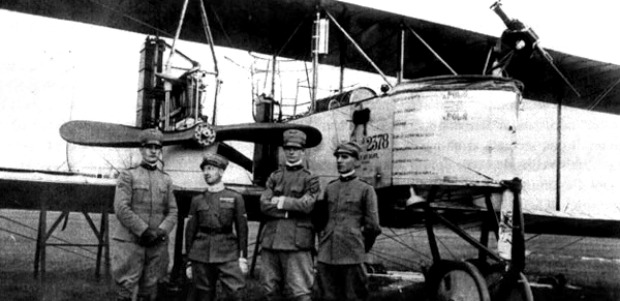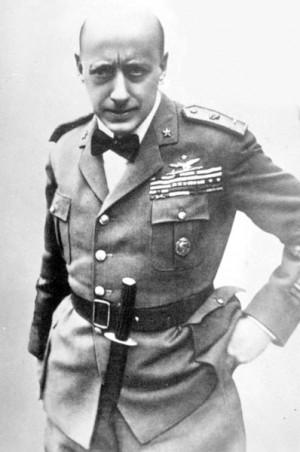You have no items in your cart. Want to get some nice things?
Go shoppingThis excerpt from one of D’Annunzio’s war diaries is inserted in the Licenza (pp. 164 ff.) as a memorial to the war days. Text from the “La Leda senza cigno/Licenza” edition, published by Oscar Mondadori, Milano, 1976; translated by Nicola Mira.

My General – from whose virile goodwill I received yesterday a gift of thorny laurel sprig, eradicated from the banks of the bleeding Podgora[i] and transplanted in a red clay vase – my General tells me that this morning the military chaplain will speak to the Caltanissetta Brigade encamped at Versa.
I travel to Versa. It’s a limpid October morning, tempered and forged like a new weapon. The roads are dry already, they’re becoming dusty again. Lines of soldiers, lines of mules, lines of military carriages. My little car, grey, slender, vibrating like a small destroyer, cleaves the battalions that open up for its passage. An unusual amount of movement everywhere. You can feel there is something in the air, that something vast is afoot. You can smell the scent of blood, like must fumes on the eve of the grape harvest. I reach the field. I look for the altar. It has been raised amidst yellowed poplars, swathed with those dark wool blankets that envelop the trench soldiers’ sleep. Some of the blankets are so old they have holes. You can see the sun shine through them.
The soldiers troop up on either side, carrying their bayoneted rifles. Their countenance is vigorous and it yearns for the thrust. They belong to the Sicilian Brigade, the bronze Brigade. Some of them are dark like the Emperor Frederick’s Saracens. Their chief bellows his commands harshly. He looks like a veteran from Eritrea or Libya, who has just hung the hippo skin crop on his saddle.
The Duke[ii] arrives, with that look of his, grave and rather distant, but plain, calm.
The mass begins. It’s officiated by a priest swarthy as a sapper, who speaks forth the sacred rites with a burning mouth issuing within a tawny beard.
The chief shouts: “Kneel down!” and the soldiers kneel, leaning on their rifles. If in churches prayers are supported by spires and pinnacles, here today they’re impaled on bayonet tips. Keen, sharp prayers. Reclining faces of beardless youth, of mature men, some of them as beautiful as the fairest from Hellas and Latium. Sensual mouths, sad mouths. Dark or reddish fuzz growing on resentful jaws, on bony chins. The whole skull shows through in some of them: and I think of the skeleton waiting within the flesh, imitating its gestures and attitudes, a prisoner. Heads that have already been touched by death, by the unremitting Labourer. A mass of cannon fodder, a well-stocked charnel house.
A gun booms towards the San Michele summit. An enemy aeroplane appears at the edge of the blue, among the gun bursts. Eyes look up towards the torn sky. You can see the whites, but not the whites of fear. A savage grin gleams in them.
The sacred rite of the mass is interrupted for the Chaplain to speak. He climbs on a vat, dominating the altar swathed in rough wool. With an unceasing patter he talks about courage. And courage listens, armed and silent.
The sky is sublimely pure, curving over the Alps, white-capped by the early snow. A slow warmth oozes from the prayers, above the naked, vertical bayonets. The wilting poplar leaves tremble continuously, gold on gold. The Carso[iii] is out there, a labyrinth of trenches, a barb-wired fort, as I have seen it from above. For sure tomorrow that warm river that forms beneath the rocks will flow.

I can’t hear the Chaplain’s words any more, his mouth has filled with saliva already. I can hear the earth’s chant, I can hear the hearts’ relentless pulse pumping the blood of sacrifice; I can hear the silence from beneath the earth and the one that waits beyond the blue.
It’s a huge hour. The greatest hour since we crossed the border and planted our flags in the redeemed land. I know that tomorrow at noon the attack will begin, the tremendous symphony will start, much grander than that of last July.
In a kind of daze I see soldiers’ faces, already lying on the funereal grass. The soul bows down to them. The sky blazes with love. I see my face in theirs, likened to that beauty. Someone bends down, recognizes me, shuts my eyes. The tide beneath withdraws, going to my head. Two men pick my body up and lay it on a stretcher.
Why am I thinking of a rock I once lifted up in a sombre wood, and let fall astonished, having glimpsed beneath it a teeming, fleeting life?
The Barnabite stops talking. The sacrifice of the mass is resumed again by the officiating priest, with a low murmur, barely a movement of lips, to allow everyone to hear the words nestled deep in their hearts.
“Be makers of the Word, not mere listeners”, is written upon the pulpit in Grado, in the Patriarchs’ Basilica.
I watch the nails on the priest’s thick boots gleam as he kneels by the altar: nails that trod mud, the damp earth, blades of grass and dead leaves.
The soldiers are kneeling again. Heads are bowed beneath the shining thicket of bayonets. You can hear a soft croaking of ravens among the yellow leaves. The Duke stands still, thoughtful, his masculine pallor furrowed by the force of a melancholia, which seems to come from the century-old depths of his ancestry of warriors and saints. He turns and looks heavenwards. The vermilion wine shines in the cup, upon the altar; and its reflection beats upon Emanuele Filiberto’s right shoulder, drawing a bright mark on the rough military cloth of his greatcoat, ample like a cinch-less tunic.
Tenuisti manum dexteram meam, et in voluntate tua deduxisti me… (Thou hast held me by my right hand, and have brought me to thine will).
A young captain, lean, tall, slender, leans towards me and tells me in a soft voice: “Allow me, Lieutenant.” Then he puts his fingers to my neck and plucks from it a wasp that was about to sting me. He holds the wasp, alive, between thumb and forefinger. He shows it to me, smiling. I smile too, remembering a wasp that buzzed on my mother’s balcony and stung me on the wrist as I was bidding farewell. A poet’s wound! Vulnus hyblaeum.[iv]
The ravens’ soft croaking among the golden leaves accompanies the end of the blood mass. Ite, missa est. The sacrifice is done. The soldiers stand up, some soft earth clinging to their knees. They present their weapons while the Duke moves, followed by his officers, to reach the place where he will wait for all the troops to muster in front of him, the curate of Glory.
The sun climbs above the meridian. Shadows are short. In the vast light, human bodies appear fleeting, ethereal. A mass of mortal flesh flows along the meadow, no heavier than a flight of clouds. Measured steps sound like dull thuds; but it seems as though, from the knees up, the men are enveloped in silence, a remote silence like the one that curves aloft on the Alpine peak, white with the early snow.
Speed placates me. Above the engine roar I hear every now and then the mortar booming on the hill. I drive to the Medea hill, to visit the observatory from which the Third Army’s general staff will view the coming attack. We manage to climb along the new road by car, risking the tires against the spiky gravel. We reach the telephone post. The soldiers are sheltering under a canopy to avoid being hit by spent shells, while our air defence guns are shooting at an obstinate Austrian flyer. I give the duty officer instructions to shield the windows that shine and would betray the post to the enemy observer. We enter a sort of redoubt, dark corridors like the Catacombs. We pass a wood-panelled room, which an ambitious painter is adorning with festoons, garlands, cartouches, as if for an augural banquet. All these workers are filled with devotion, ardour, throb. Are they building and decorating the Victory Belvedere?
From the hill’s summit, what a sight! The plain is sweet as a welcome, the hamlets dove grey, the towns shining white, condemned Gorizia, the mountains and hills flowing with Italian blood and rich in bones as much as in rocks. Everything is autumn gold and distant blue. Around the aeroplane there’s a crown of white cloudlets, seraphic almost. Medea’s flanks are robed in acacias, poplars, brush. I feel like lying on the bonnet and going to sleep.
But if I lay down, I would not sleep. Restlessness is hunting me. It comes back to my sanctuary on the Ausa, to my two low-ceilinged rooms that a hunter’s or a local ornithologist’s mania has filled with stuffed birds. My eyes flee the palmipedes to take comfort in the Nike of Samothrace, in Brescia’s Victory[v]. What shall I do until tomorrow? A dispatch arrives. The sailors of the Morosina island naval battery trust that the Sea Lancer will be with them tomorrow at noon. I see anew the blondish beach, the gangways on the mud, the wooden towers hidden in an oak’s foliage, the blue Sdobba, a patch of the Capucine wood, Ronchi, Doberdò, the Monfalcone wilderness, the Rocca and Duino on the rocky precipice, and the red landslide at Sistiana, and beyond that Barcola, and further on Trieste and indigo-tinted Istria. The voices of sailors and ravens among the trees. A seagull shines occasionally through the air, like an aeroplane. Two cavalrymen look at the telephone lines, their small shaggy horses beneath the foliage. Inside the observatory hidden within the oak tree, the commander makes calculations on a notebook, between a protractor and binoculars. The sun shines on the polished wood trestles. The loudspeaker, a large metal bugle, green-stained, hangs on a branch. They are waiting for the first salvo. “Gun number one, set! Shrapnel, fire!”
Visions, apparitions and dreams kidnap my spirit ceaselessly, if I linger, if I sit down, if I rest.
[i] A plateau in Friuli, theatre of the Isonzo battles from June 1915 to March 1916.
[ii] Emanuele Filiberto di Savoia – Aosta, of the Savoy ruling house, “the Unvanquished Duke”, general of the Italian 3rd Army in World War One.
[iii] A large plateau in north-eastern Friuli, a major theatre of war operations.
[iv] A wound from Hybla, a Sicilian mountain famous for its bees.
[v] A bronze statue celebrating the liberation of Brescia from the Austro-Hungarians in 1849.

About Nicola Mira
Nicola is a London-based literary/academic translator (from Italian and French). His native language is Italian, he has a British education and has lived and worked in Italy, France and the UK. He has translated works by Italian early XXth century authors C. Malaparte and G. D’Annunzio, and philosophy articles by L. Renault and K. S. Ong Van Cung (from French). When he is not translating, he loves reading, writing and sports. He is founding partner and managing editor of a sports statistics website www.greatestsportingnation.com. Professional qualifications and experience: member of English PEN and assessor in Italian for PEN Translates; member of the Emerging Translators Network, London; English and French reader for Bompiani publishers, Italy; business translations: he collaborates with several agencies to earn his daily bread; Education: BA in Politics & Economics, Saint Edmund Hall, Oxford (1982).

